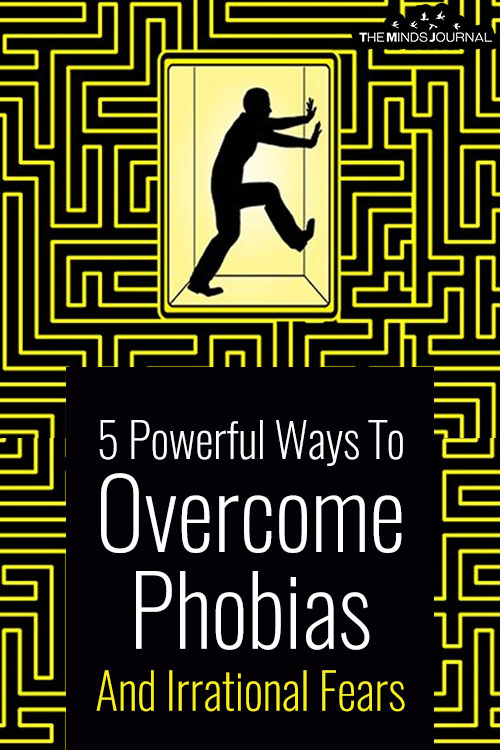Do you avoid circumstances and situations due to irrational fears? Are you preventing yourself to living up to your fullest potential due to certain phobias?
Don’t worry, there is a way to get out of this dark pit that you may feel you are trapped in.
Fear is a completely natural response as it enables us to avoid unnecessary risks and dangers and helps us to stay safe. Let’s face it, who wants to feel scared willingly, unless you are watching a horror movie. We are wired to avoid hurtful and frightening experiences in life so that we can live long and healthy.
However, if your fear seems irrational and you are unable to control your response, then you may have a phobia. A phobia is a feeling of excessive fear of a certain situation or something that overshadows the danger it poses. As a result, people with phobias tend to avoid those situations and hide from potential opportunities and challenges that allow us to live a happy and fulfilling life. However, you need to realize that you cannot hide from your fear forever. You will need to face it sooner or later and it will happen at a time when you are least ready. So let us take a look at how you can overcome phobias and irrational fears in the easiest possible way.
What Is A Phobia?
A phobia is an intense irrational fear of something usually stemming from a terrifying or bad experience during someone’s childhood.
Almost all of us are afraid of something or the other. It can be a physical thing, a situation or even a thought of doing something. However, when your fear causes uncontrollable anxiety and affects your daily life, then they are known as phobias. It is an extreme fear of a certain thing that might not pose any real danger. There are various types of phobias like social phobias, animal phobias, environment and natural phobias, situational phobias and blood-injection-injury phobia. You can be phobic about practically anything. Although, phobias primarily develop during your childhood, you may even become phobic about something in your adult life as well.
Your environment and circumstances play a crucial role in the development of your phobias. Experiencing a petrifying event during childhood or in adult life can trigger the development of irrational fears within us. If you encountered a deadly snake as a child, you may be afraid of snakes in general. If a relative died in a car crash, you may become afraid of driving. So, a phobia can develop from anything and everything depending on how much you were impacted by the incident.
Although almost all of us have had some bad experiences in childhood, not all of us will suffer from phobias. It is a disorder that only affects certain individuals depending on specific factors like genetics, personality traits, age and the intensity of the experience.
Read 100+ Types Of Common, Unique and Bizarre Phobias
Understanding Your Phobia
Having a clear understanding of your phobia is essential if you want to overcome phobias and irrational fears.
First of all, you need to identify whether it is just a fear or an actual phobia. Although it can be difficult to know the difference, feeling nervous, anxious or experiencing butterflies in the stomach when faced with the object of your aversion can be a simple fear. However, if you react dramatically by screaming, running away or completely avoiding a situation or even losing your sleep over an upcoming event, then you may have a phobia.
When you are phobic, you will probably realize that your fear and reaction to it is irrational, but you will still be unable to control your emotions. You may feel anxious simply by thinking about the object of your fear. The feeling and response are overwhelming and mostly automatic. However, you should also understand that being phobic does not mean that you are foolish or crazy. Once you understand your phobia, you will be better able to overcome phobias and irrational fears and start living life freely.
For example, there is a meaning behind phobia you have. Do you know the real truth behind seeing spiders meaning?

5 Ways To Overcome Phobias
There are a number of therapy and self-help techniques that can help you treat your phobia. If you are experiencing extreme discomfort and panic attacks due to your phobia, then it is best to seek professional therapy. However, if you realize that your phobia is irrational, then self-help strategies can be really helpful.
So here are the 5 most helpful tips to overcome phobias and irrational fears.
#1 Start climbing ‘The Fear Ladder’

The Fear Ladder strategy is a highly effective technique that allows you to face your fears in a controlled situation. Although you want to avoid what you are afraid of, the fear ladder helps you cope with your phobia by facing it and eventually realizing that it may not be as scary as you might have perceived. This will enable you to gain control over your feelings and responses. As a result, your phobia will become less daunting and scary.
By moving up the fear ladder one small step at a time, you will repeatedly and gradually expose yourself to your fears and eventually overcome it.
By experiencing your fears repeatedly, you will learn to reduce your anxiety and realize that it doesn’t pose as big a threat as you expected. Your phobia tends to become weaker every time you face your fear. You gain more control over yourself and become more confident.
When climbing the fear ladder, focus on the final goal as it will motivate you to move up. Make sure you climb up one step at a time and do not move ahead unless you are completely comfortable in the stage you are in. Once you are ready, you may move to the next step. You can go as slow as you need to be.
If you are afraid of spiders, for instance, then your fear ladder should comprise of the following steps:
- Step 1: Go online and look at a few pictures of different species of spiders.
- Step 2: Watch a documentary video that explains the nature and habits of spiders as natural beings.
- Step 3: When looking at the pictures and videos, try to appreciate the beauty in these creatures, instead of feeling afraid. Realize they cannot harm you through the screen.
- Step 4: Try to look at spiders from a safe distance in your house or in your neighborhood. It can be a tiny spider or a large spider, depending on your mindset. Observe their behavior.
- Step 5: Try to hold a toy spider in your hand realizing that it is simply a toy. The goal is to tolerate being around what scares you.
- Step 6: Go and watch different species of spiders at the zoo or a spider farm.
- Step 7: Take pictures of spiders that are near you. Try to focus on the composition of the photograph instead of the spider.
- Step 8: Find out people who have pet spiders and visit them. Observe how the spiders behave in their enclosure.
- Step 9: Watch people handle and feed their pet spiders. These people can tell how amazing spiders can be, something you never considered before.
- Step 10: Capture a small spider in your house with a glass container and observe it. Make sure to set it free later and not harm it.
- Step 11: Next capture a large spider once you are comfortable and look at it from up close. Set it free once you are ready.
- Step 12: Finally, hold a pet spider, if and when you are ready. The owner can help you with holding the spider and show you how harmless it is.
Practice as often as needed and maintain a pace that you feel comfortable with. Eventually, your fear will fade and will be replaced by confidence.
Read Accept What You Can’t Control, Control What You Can
#2 Read and learn about your phobia
Read and gain some basic knowledge about the psychological aspects of your phobia. When you understand what it truly means to experience fear and how our mind reacts to it from a neutral point of view, you will realize how irrational your fear is. You can also read about your specific phobia (our spider, for instance) and learn about their biology. Find out which species are venomous and which ones are harmless. What type of spiders are found in households and which ones are available in the wild.
The more knowledge you gain the better you will be able to overcome phobias and irrational fears.
#3 Practice relaxation techniques

Physical reactions like difficulty in breathing, pulsating heart, shivering and numbness can be the worst part of experiencing phobias. One of the best ways to overcome phobias and irrational fears is to practice deep breathing exercises that will help to reduce your anxiety and panic. When you breathe deeply from your abdomen, you will be able to calm your mind and slow down your thought process. This will help you control your emotions and, in turn, your responses to panic-inducing situations. Practicing mindfulness meditation every day for at least 10 minutes can also be highly helpful in coping with phobias.
#4 Get help from a friend
If you are afraid of certain situations like visiting crowded places or flying, you can ask a friend or a family member to offer you some company. This will help you feel less anxious and be more comfortable about facing your fears. If you are afraid of social situations, then having a friend by your side can enable you to be more active and social. Your friend can act as a support system. You will not be required to face strangers and random people all alone, and slowly you will become more comfortable in crowds just by yourself.
#5 Join a support group
There are various support groups out there that help people cope with different types of phobias. By attending such groups and talking with them, you will realize you are not alone who experiences such intense feelings. Encountering like-minded individuals and focusing on positive transformation can boost your chances of recovery. You can also join an online chat group and talk about your issues and find a solution together.
Yes, phobias are one of the worst things you can experience and it can surely limit your life experiences. So, make sure you get your fears under control and start enjoying life as you are meant to be. Remember to be kind and patient with yourself as you are taking a brave new step towards self-improvement.
Be courageous and move one step forward at a time.
Good Luck!









Leave a Reply
You must be logged in to post a comment.